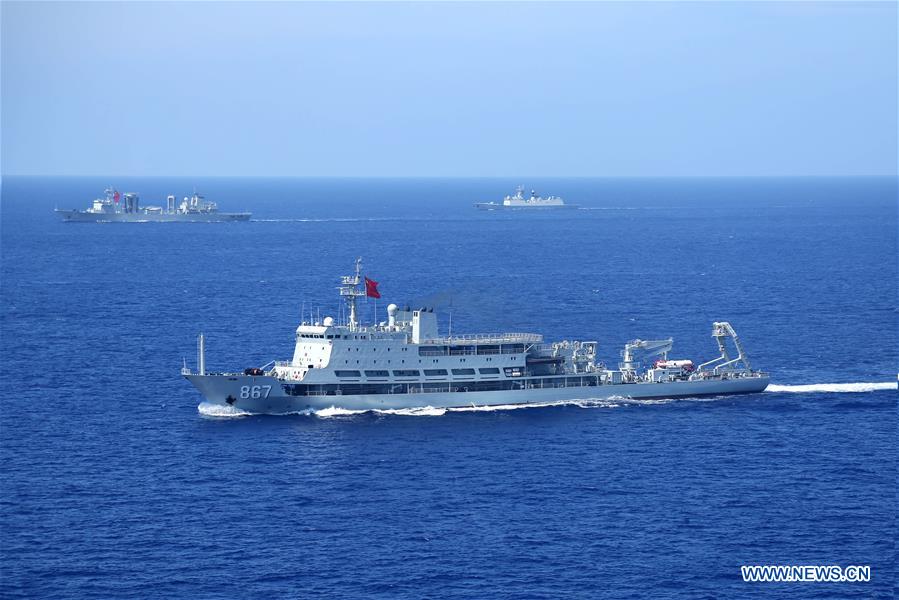


A Chinese fleet participates in the Rim of the Pacific (RIMPAC) multinational naval exercises with U.S. warships in west Pacific Ocean, June 20, 2016. (Xinhua/Luo Zhaowen)
The Chinese Foreign Minister on Wednesday blasted the U.S. for excluding China from a multinational military exercise to be held in June, noting that the decision was “imprudent and unconstructive.”
“Such a decision will not help to enhance mutual understanding and trust between the U.S. and China, which are both world powers. The two nations can definitely cooperate regarding maritime security,” said Wang Yi, State Councilor and Chinese Foreign Minister, at a press conference with U.S. Secretary of State Mike Pompeo after their meeting in Washington, D.C.
Wang’s remarks come after the U.S. withdrew an invitation to China to join the world’s largest international maritime warfare exercises. According to CNN, the decision was made by U.S. Defense Secretary James Mattis in coordination with the White House, which comes just days after China’s Air Force landed their advanced H-6K strategic bomber on an island in the South China Sea for the first time.
This would have marked China’s third consecutive participation in the drill, as the country had already accepted the invitation from the U.S. in January.
Blowing hot and cold, U.S. accusations of China “militarizing the South China Sea” have irritated the country, with Wang noting that it’s China’s legitimate right to construct its own islands.
“The U.S. has built military facilities in Hawaii and Guam. Compared to the U.S., China’s military deployment is to a much lesser scale, thus there is no need to hype up [China’s South China Sea movements],” Wang added.
Due to the Obama Administration’s efforts to stabilize Sino-U.S. military ties, China had already been included in the Rim of the Pacific naval exercises twice, in 2014 and 2016 respectively.
According to experts, China’s former participation in the naval exercises was a milestone for Sino-U.S, relations, as the U.S. National Defense Authorization Act for the Fiscal Year 2000 prohibits advanced combined-arms and joint combat operations between the two nations, in fear that such cooperation may create a national security risk due to inappropriate exposure.
In 2016, China sent five vessels and over 1,000 personnel to join the drill.
 Fire brigade in Shanghai holds group wedding
Fire brigade in Shanghai holds group wedding Tourists enjoy ice sculptures in Datan Town, north China
Tourists enjoy ice sculptures in Datan Town, north China Sunset scenery of Dayan Pagoda in Xi'an
Sunset scenery of Dayan Pagoda in Xi'an Tourists have fun at scenic spot in Nanlong Town, NW China
Tourists have fun at scenic spot in Nanlong Town, NW China Harbin attracts tourists by making best use of ice in winter
Harbin attracts tourists by making best use of ice in winter In pics: FIS Alpine Ski Women's World Cup Slalom
In pics: FIS Alpine Ski Women's World Cup Slalom Black-necked cranes rest at reservoir in Lhunzhub County, Lhasa
Black-necked cranes rest at reservoir in Lhunzhub County, Lhasa China's FAST telescope will be available to foreign scientists in April
China's FAST telescope will be available to foreign scientists in April "She power" plays indispensable role in poverty alleviation
"She power" plays indispensable role in poverty alleviation Top 10 world news events of People's Daily in 2020
Top 10 world news events of People's Daily in 2020 Top 10 China news events of People's Daily in 2020
Top 10 China news events of People's Daily in 2020 Top 10 media buzzwords of 2020
Top 10 media buzzwords of 2020 Year-ender:10 major tourism stories of 2020
Year-ender:10 major tourism stories of 2020 No interference in Venezuelan issues
No interference in Venezuelan issues
 Biz prepares for trade spat
Biz prepares for trade spat
 Broadcasting Continent
Broadcasting Continent Australia wins Chinese CEOs as US loses
Australia wins Chinese CEOs as US loses